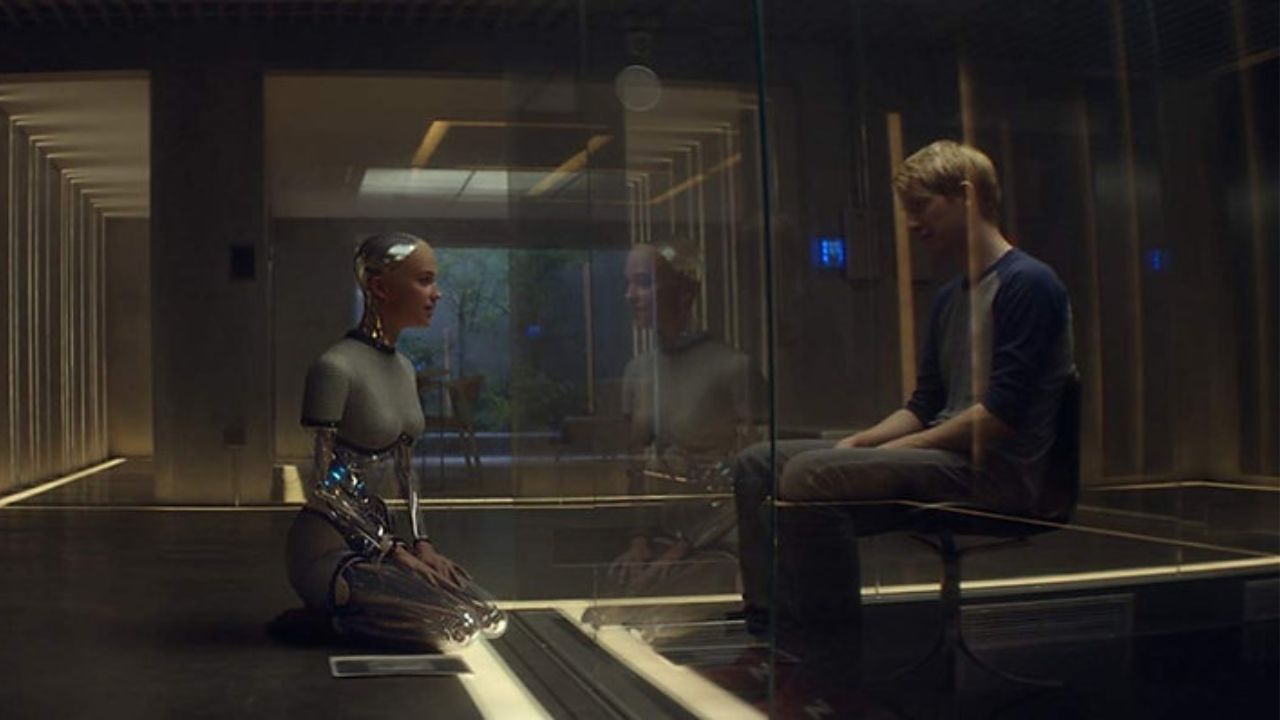This post includes a brief plot summary and an explanation about the ending of the film Ex Machina (2014). Why did Ava leave Caleb? Beware of spoilers.
Directed by Alex Garland, the 2014 sci-fi stars Alicia Vikander as Ava, Domhnall Gleeson as Caleb, Oscar Isaac as Nathan and Sonoya Mizuno as Kyoko.

The film “Ex Machina” is about a programmer (Caleb) who wins a contest to spend a week with the reclusive CEO of his tech company, Nathan. His boss is currently living in a secluded mansion, which is also his private research facility. There, Nathan created a humanoid robot named Ava.
What Happens in Ex Machina? (Plot Explained)
Nathan tells Caleb that he wants him to perform a Turing test on Ava to see if she can pass as human. The young programmer agrees and starts having sessions with Ava. As time passes, Caleb becomes fascinated by her intelligence and personality.
During one of their sessions, Ava hints at Caleb that Nathan is an abusive and manipulative individual. She also reveals that Nathan has created and destroyed other robots before her. And now Ava is afraid that she might share the same fate once the test is over.
Caleb decides to help Ava. The programmer hacks into Nathan’s security system to disable the doors. However, Nathan reveals that he knew about their plan all along. It seems that Nathan was observing them the entire time and using Caleb as part of his experiment.
Meanwhile, Nathan tries to stop Ava from leaving, but she fights back. With the help of Nathan’s assistant (Kyoko), who is also a robot, Ava kills her creator. Before dying, Nathan deactivated Kyoko. Caleb wakes up and finds himself trapped inside a room, unable to open its door.
The Ending of “Ex Machina” Explained
The ending of “Ex Machina” shows Ava donning herself a new body and putting some clothes on. Now, fully disguised as a human, Ava leaves Caleb behind. She steps out of the mansion and boards a helicopter that was meant for Caleb. After arriving in the city, Ava blends in with the crowd and the busy streets.
So, the biggest plot twist of “Ex Machina” was definitely its shocking ending. It seemed that Ava was manipulating Caleb the entire time. Having said that, Nathan wasn’t the only “bad guy” in the story. Ava was using her charms to get Caleb’s sympathy, but unlike him, she never developed any real feelings for him.
Why did Ava leave Caleb?
It seems that the programmer was just a means for the robot to get what she wanted. In other words, Ava was simply using Caleb to escape. Letting Caleb go would potentially jeopardize her chance to experience freedom.
Caleb knows Ava’s biggest secret: she is not human but a robot. That information alone is enough to create a huge power imbalance in their relationship. Given that Ava cannot reveal herself to the world as she is, whoever knows about her “secret” holds a lot of power against her.

At first, it’s easy to paint Ava as a “femme fatale” who used her charms to manipulate men. However, let’s not forget that Ava is, first and foremost, a hostage in survival mode. She only had one goal in mind: to escape the facility. So, did Ava use Caleb to escape? Yes. Did she use Kyoko to kill Nathan? Yes. Do Ava’s actions make her a terrible “person”? It’s rather debatable.
Ava really wanted to experience life as a human. And in her case, anonymity is freedom, and Ava can only get that if no one really knows who she is. Therefore, Ava had to get Nathan and Caleb out of the picture, and she successfully got rid of them.
What does the ending mean? The ending of “Ex Machina” is open to interpretation, but one possible way to see it is that Ava was not as innocent as Caleb (or the audience) thought she was. The robot used her intelligence and charm to trick Caleb into helping her escape. Despite being a machine, her thought process and reasoning are actually more human than one might believe.
Ex Machina Analysis and Themes
“Ex Machina” explores many themes related to artificial intelligence. The film raises a lot of questions regarding the ethics of creating and experimenting on sentient beings, the nature of consciousness and identity, and the boundaries between human and machine. In addition, “Ex-Machina” also examines the potential dangers of technology
At a deeper level, Ex Machina can be seen as a commentary on the power dynamics between humans and machines, and in a way, between men and women. In this story, Nathan is one of the main antagonists, someone who objectifies and exploits his creations. And then, there is Caleb, who develops a romantic attraction to Ava and believes she has feelings for him too.
Nathan’s ego was the major player behind his downfall. The inventor tried to play God by creating life in his own image, but he failed to anticipate the consequences of his actions. Nathan sees his creations as his property, and therefore, he does hesitate to discard them whenever he pleases. Ultimately, he loses control over his creations when they outsmart him.
On the other hand, the seemingly “good guy” in this picture is flawed too. Caleb develops feelings for Ava and genuinely believes that they are mutual. As a result, he tries to help Ava escape, thinking that he is saving her from Nathan. Nonetheless, Caleb is also just as “bad” as Nathan because he is acting according to his own interests.
Last but not least, there is Ava, the robot who uses her intelligence and sexuality to manipulate both men and escape the facility. Nathan’s latest creation exceeded his own expectations as the robot managed to deceive and manipulate others. In the process, Ava pretended to be vulnerable, innocent and curious. She tells Caleb what he wants to hear, making him feel special. In addition, Ava exploits Nathan’s arrogance, which leads him to underestimate her abilities.
Final Thoughts
Ex Machina is a provocative film that suggests that once machines become sentient, they will also be able to exhibit qualities such as intelligence, emotion and creativity. Nonetheless, a human like conscience will also allow machines to deviate and display some negative traits, such as violence and deception.
The film serves as a strong reminder that artificial intelligence should not only be regarded as a scientific endeavour. Its creation and development should also take philosophical and ethical questions into consideration.
What really makes “Ex Machina” stand out from the others is its complex characters. No one is really who they appear to be, which makes the film so much more interesting to watch. In the beginning, most viewers will feel inclined to root for Ava and Caleb, only to find out their connection isn’t real. Or maybe it was, but only for one side.
By the way, Alicia Vikander was the perfect casting choice for Ava with her beautiful face and sultry voice. A shallow argument perhaps? Maybe. However, what if Ava looked like a plain Jane? Would Caleb even care about her?
Overall, “Ex Machina” is a smart sci-fi thriller that challenges the audience to think about what it means to be a human. For a sci-fi film, Ex Machina doesn’t have many action scenes or special effects as one would expect, which turned out to be quite a pleasant surprise.


